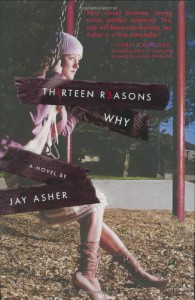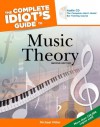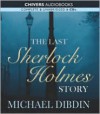2
Followers
22
Following
Welcome to my blog!
I enjoy reading, prolly a lot like you!! I read all kinds of things; it's easy because there is always so much good stuff!! Welcome to my blog, where we can post about all the good things we find!
Currently reading
The Execution of Sherlock Holmes: And Other New Adventures of the Great Detective
A Separate Peace
The Enneagram Made Easy: Discover the 9 Types of People
Jane Eyre
The Complete Idiot's Guide to Music Theory
Gone, Baby, Gone
Trouble with Poetry
The Funny Thing Is...
The Last Sherlock Holmes Story
The Wounded Heart: Hope for Adult Victims of Childhood Sexual Abuse
 Alright... second review on Goodreads! Please save bricks till the end.
Alright... second review on Goodreads! Please save bricks till the end.Well... I read this book my sophomore year of high school. To put things sharply and bluntly, when I finished I was extremely, extremely upset with this story, ESPECIALLY Hannah. If you're not ready for a rant, then please read another review.
This book came off as very, very irreverent to the memories of everyone who has committed suicide because of real depression. I mean real depression not as the kind that people fake or force onto others in order to make people feel bad for them. Depression isn't /really/ able to be controlled; people aren't just "in a hole" in life, they are devastated individuals who may feel under any circumstance they have no chance left for happiness or otherwise, who may feel like they have no one and for that reason, /are/ no one. You are, quite literally, wrestling everyday with something so beyond you that you may feel that you simply can do nothing no matter how much is done. Real depression for people who sincerely believe that it doesn't matter if they live OR die; that their life matters just as much as their death and would cause no net amount of pain to the rest of the world if they ended it all.
This is the breaking point of the human psyche. It's difficult to imagine for anyone who hasn't known it, because it feels like complete emotional devastation, and no one wants to imagine that under any circumstances or for too long, or we'd all crumble.
That being said, I simply can't stand it when an author (or anyone, for that matter) "waxes poetic" about something that doesn't merit the raw emotion. The worst part about this book was Hannah complained constantly about nowhere near a hopeless emotional situation. Maybe a dire one, but not one that merits the amount of emotional weight that she and Clay were constantly making a point to put on it. It seemed like her "reasons" were just a bunch of complaints, unrelatable, unrealistic, and just forced... lots of "look at what you've done to me! Woe is me!" along the way, instead of three-dimensional hopelessness. I was never really able to sympathize with ANY character because of all the perceived wangst.
(Clay-freaking-out-in-the-rain-hurting-yourself-and-screaming scene...... I'm looking at you.)
So stems my negative feelings for this piece of work. The protagonist, Hannah, just felt so /whiny/...! I understand that when you're in high school, that social hierarchy and peer interaction matter a LOT. Heck, I'm still in school. I know how hard it is and how much effort it takes to finally get over yourself and not care what anyone thinks, because no matter how hard you try in life, there is never a foolproof way to please anyone. But... this is nowhere near the desperate plea for help that frequents victims of multidimensional depression. This is a girl who's been wronged, of course, but she is the one who makes the choice, knowing fully well that it would hurt people, and even made that the point of her death. Her suicide was not because she felt no one had anything to gain and anything to lose from her death. She committed suicide with the /intent/ of making people feel bad about themselves for not helping her out. That puts such a bad taste in my mouth I can't even begin to explain. She didn't even bother looking for reasons to live, the thing that hopelessness so ardently searches for. She ended it because she wanted to spread the hate she harbored in herself to everyone that's hurt her. Gee, guys..... that really burned my biscuits to a fine salty crisp. It was absolutely unacceptable, and it made me a lot angrier with the character of Hannah than anything else.
She reminds me of the people I've known in my life who have said, "I'm going to kill myself and then you'll regret it!" to get peoples' panties in a bunch about them and then acted fine and dandy when they got what they wanted. We all know the type. Hannah /takes the list of suicidal symptoms/ and /follows them like a checklist/ to get people to notice her, instead of legitimately reaching out for help. It didn't feel like she was grasping for help at all; it just felt like she was grasping for attention and sympathy.
I remember the part that angered me the most was the end. I read this book last year so I might be remembering this wrong, but I remember her setting up this "I swear, if he tells me to yyy" just before the meeting with her counselor, and then the minute that yyy was his first suggestion, she just walked out on him. I remember thinking, he offered a legit piece of advice to her! And even if it did upset her that much, she didn't even bother with telling him her feelings about it and just decided the entire world was against her when really, she was the one pitting HERSELF against the entire world, INTENTIONALLY. I definitely felt this book acted as more of a mockery of the feelings associated with true suicide victims; not just the ones like Hannah who threaten to commit it to make everyone come running to her to start apologizing, but the true, soul-crippling, emotion-devouring vacuum of hurt that leads one to believe that there is nothing left for them in this world. The only thing Hannah had, was enough self-pity to make her KILL herself in order to take it out on the people who had "wronged" her. That's not depression. That's hate. Hannah's overwhelming hatred got in the way of making her a character to be sympathize with, as I felt the book was trying to make her out to be.
I've always felt my depression as something that consumes you, but it felt the opposite with Hannah; it seemed like she was her own pathology, expecting everyone else to fix her own problems. She had a support system: her parents, the rest of the people at school she didn't bother with, even just Clay, if she liked him so much. She wasn't entirely abandoned, entirely broken, and she just came off to me like a hateful girl with a lot of adolescent grudges who wanted to "get back" at these eeeevil people who had hurt her. Don't get me wrong, some of the stuff that happened to her was BAD and definitely wasn't her fault, but a lot of it -- the worst parts of it -- were caused/led on by her own decisions (actually going to the party, walking out on the counselor, letting the boy in the pool have his way etc). Overall, it was very childish, and it portrayed suicide as something you do when you just don't like life as opposed to fighting against all the stacked odds in every ounce of your energy going towards trying to /make/ yourself believe that /you are worth it/.
Everyone deserves to be happy. It's when people start to hurt others in the pursuit of their happiness that things ger out of line. In light of that, it's evident that Hannah's bullies were doing this systematically. But, Hannah's last course of action -- to make the tapes, send them out, and psychologically torture people with her memory -- isn't that the same thing? Hannah, you've essentially /become/ one of your bullies by doing that. I just don't have sympathy for you.
(Also, what a coincidence that the narrator is the only "good guy". I mean, really.)
To conclude, I simply couldn't stand this book's nonexistent guts. It inspires people to whine about suicide in order to get attention and make people feel bad. It encourages them to think that suicide is the perfect way to get back at all the people who have hurt them. It encourages people to hurt as you have been hurt and wait for people to "see" that you are depressed, to drown in self-pity and give the universe the middle finger for all the bad things that have happened to you, instead of struggling with all your might to keep your head above water because you care about the people you have left, or getting out there and making a beautiful world for yourself, as we all must. The author was clearly aiming for a strong and worthwhile message -- be aware of everything you say and do, because you don't know a person -- but the character of Hannah doesn't seem like someone I want to know anything about. I wish that I could have liked Hannah, because I know how the loneliness of being rejected by your peers, especially in high school, can push you over the edge, what with all the bullying cases nowadays. But more often than not, you hear stories of these kids /trying/ to find help for themselves, but people reject them somehow. This didn't feel like the case with Hannah.
(This is a rough topic to talk about, especially in the negative sense, and I can only pull from my own fight with depression. So, if you've got a viewpoint to add, please let me hear it. Be polite though. Seriously.)
Alright, waiting by the window. Bricks ahoy! lol
(Also, just thought about it right now: Hannah -- angst + uncontrollable slapping hand = Clarissa Fray. Think about it!)
(Why is it that every YA novel I actually take the leap to read has teenage female protagonists that all act identical to each other...?! Ok that's it.)










